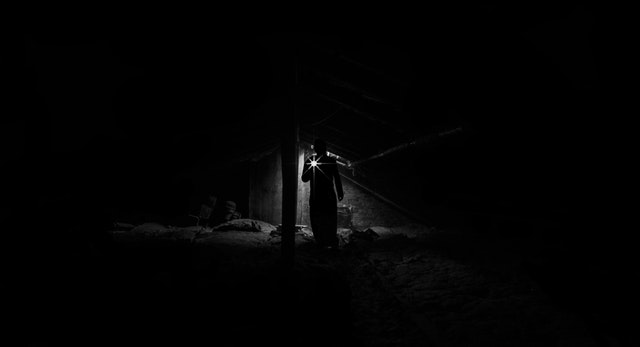
“While imprisoned in a tiny prison cell for his attempts to reform the Church, sixteenth-century Spanish mystic John of the Cross composed many of his now classic poems of the soul’s longing for God. This poem is,
“Dark Night of the Soul.”
On a dark night, Kindled in love with yearnings—oh, happy chance! — I went forth without being observed, My house being now at rest.
In darkness and secure, By the secret ladder, disguised—oh, happy chance! — In darkness and in concealment, My house being now at rest.
In the happy night, In secret, when none saw me, Nor I beheld aught, Without light or guide, save that which burned in my heart.
This light guided me More surely than the light of noonday To the place where He (well I knew who!) was awaiting me— A place where none appeared.
Oh, night that guided me, Oh, night more lovely than the dawn, Oh, night that joined Beloved with lover, Lover transformed in the Beloved!
Upon my flowery breast, Kept wholly for himself alone, There he stayed sleeping, and I caressed him, And the fanning of the cedars made a breeze.
The breeze blew from the turret As I parted his locks; With his gentle hand he wounded my neck And caused all my senses to be suspended.
I remained, lost in oblivion; My face I reclined on the Beloved. All ceased and I abandoned myself, Leaving my cares forgotten among the lilies.
Though full of mystery, John of the Cross’s poem revealed a secret. The reposed one’s gentle hand wounded the loved one’s neck and the senses were suspended. Lost in oblivion, face buried in the beloved one, everything ceased, and then “I abandoned myself.” Wow! I would like to conjecture before I read Saint John’s books of commentary.
Imagine a child runs across the stage where an old style motion picture is being shone on the screen behind him. The child imagines to be in the scene, but rudely discovers he is not a part of that movie. The movie carries the appearance of reality but his form only causes a silhouette of his body to cut into the shining projection, the two substances never mix –never can.

To explain my imperfect metaphor, everything connecting St. John (in the Poem) to the imaginary (motion-picture-world scene) was eliminated — at the touch of the wound. For John, all imaginary, fantasy-driven, sight, sensuality, or demonically-projected stuff died sense-wise — the former life. The child’s eyes open, as did John’s, they find the truth, and both abandon themselves to it..
Friends, many Bible people suffered physically as did John of the Cross, so finding the rude awakening and then Their lover, God Himself.
Jonah spent three nights in the belly of the great fish, he is caught in a personal hell, subjected to fish digestion, and “woe is me.”

The three Hebrew Boys entered a fiery furnace, the abyss of burning. It surprises no one that David, running from Saul, cries, “my soul thirsts for Thee, my flesh yearns for Thee, in a dry and thirsty land where there is no water.”
Job also found what Elijah found when running from Jezebel, and Moses learned at the Red Sea:
They discovered the presence of God, though totally invisible to them in their darkened circumstance up until the final moment.
This is what John of the Cross discovered, buried his face in and abandoned himself to. His future changed drastically as Psalm 139’s words began so real. “Where can I go from Your Spirit? Or where can I flee from Your presence? If I ascend into heaven, You are there; If I make my bed in hell, behold, You are there. If I take the wings of the morning, And dwell in the uttermost parts of the sea, Even there Your hand shall lead me, And Your right hand shall hold me. If I say, “Surely the darkness shall fall on me,” Even the night shall be light about me; Indeed, the darkness shall not hide from You, But the night shines as the day; The darkness and the light are both alike to You.
Beloved, fear not the Dark Night of your Soul. Look for Jesus, He shines in dark places. love ya

Be First to Comment